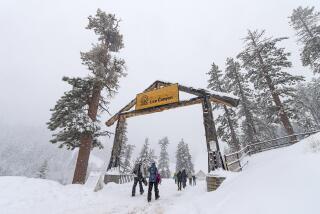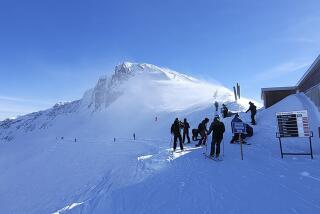Man’s Best Friend Sniffing Out Skiers in Trouble
- Share via
SALT LAKE CITY — For the rescue hounds manning Utah’s ski resorts, working like a dog goes with the job.
The resorts keep teams of elite rescuers on hand. But unlike the usual hard-core adrenaline junkies, some of these rescuers have wet noses and names that include Ginger, Timber and Whiskey.
The dogs, a bevy of shepherds and retrievers, are able to sniff out skiers caught under layers of snow in avalanches.
“They can cover territory faster than a probe line or a search line,” said Marjorie Jaques, team leader and dog handler with Park City Mountain Ski Resort.
To be first on the scene, the dogs need to be comfortable riding ski lifts, Sno-Cats, snowmobiles and helicopters. That, along with the skills needed to search the avalanches, requires constant training.
When the rare slide occurs within the resorts, the dogs are right there to help. More often, they are dispatched to the back country to find the missing.
Together, rescue teams from resorts along the Wasatch Range join in the nonprofit group Wasatch Backcountry Rescue, which helps officials respond to emergencies in the mountains.
“My search and rescue calls upon them quite a bit,” Salt Lake County Sheriff Aaron Kennard said. “They’re ready, willing and able to help us out in any situation, bless ‘em.”
Wasatch Backcountry Rescue was founded in 1976 after a back-country avalanche prompted experts to coordinate efforts, said Peter Schory, the group’s vice president and founder.
The organization includes ski patrollers and ski guides from around the area. And, of course, the dogs.
In all, 35 dog teams are part of the organization.
The dogs are important for a simple reason: “They do the same amount of work as 400 people,” Schory said. “They’re amazing animals.”
Alta, Snowbird, Solitude, Brighton, the Canyons, Park City Mountain Resort, Deer Valley and Snowbasin all have their own dog teams, which participate in Wasatch Backcountry Rescue, Schory said.
On a recent morning, Reggie, a black Labrador retriever, prepared for avalanche duty at Park City Mountain Resort. Along with a trainer, the dog trod along the crest of a mountain.
Then, foundering in the deep, soft snow, Reggie zigzagged down the slope.
His job was to pick up the scent of another trainer, Jaques, who had been carefully buried alive under the snow for the exercise.
Reggie suddenly sniffed out Jaques and made a beeline for her. He dug furiously, then grabbed the trainer by her pant leg and pulled her from the snow.
His reward for the successful search was one of his favorite toys: a leather glove.
Each dog at the Park City resort goes through this test at least once a week, Jaques said. It’s training that may come in handy this winter.
But despite the efforts and expertise, the dogs combing the aftermath of back-country avalanches have so far uncovered no survivors, just bodies, Schory said.
Most people will die within minutes of a slide. Even though the scent of a human will waft through the snow, that takes time. Experts agree the best lifesaving device is an avalanche transceiver.
“The dogs around here are amazing,” said Mike Olson, one of the lead guides for the helicopter-ski service Wasatch Powderbird Guides, which shuttles the dogs to the back country during emergencies. “It’s a real job. They are meant to be workers, and they are.”
And it appears that there will be plenty of work for the four-footed rescuers this season. Avalanche conditions in the Wasatch Mountains are ripening, Schory said.
He estimated that 24 inches or more of snow would cause serious trouble in the back country.
“We have an extremely weak snowpack right now,” Schory said. “As soon as it snows, we’ll be going into a fairly serious avalanche cycle.”
More to Read
Sign up for Essential California
The most important California stories and recommendations in your inbox every morning.
You may occasionally receive promotional content from the Los Angeles Times.










